
Peter van Eyck was a German-American film and television actor. Born in Prussian Pomerania, he moved to the United States in the 1930s and established a career as a character actor. After World War II, he returned to his native country and became a star of West German cinema.

Under False Flag is a 1932 German spy thriller film directed by Johannes Meyer and starring Charlotte Susa, Gustav Fröhlich and Friedrich Kayssler. It was shot at the Johannisthal Studios in Berlin from the end of November 1931 to the beginning of 1932. It was made by Deutsche Universal, the German branch of Universal Pictures, in co-production with Tobis Film. The film's sets were designed by the art director Otto Hunte. It premiered at Berlin's Ufa-Palast am Zoo. The film was based on the novel of the same title by Max W. Kimmich, who also worked on the screenplay.

The Curtain Falls is a 1939 German crime film directed by Georg Jacoby and starring Anneliese Uhlig, Elfie Mayerhofer and Hilde Sessak. It was based on a play by Paul van der Hurck and was made by UFA at the company's Babelsberg Studios in Berlin. The film's sets were designed by the art director Erich Kettelhut.
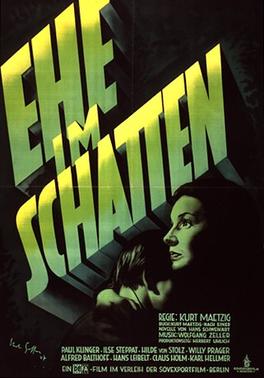
Marriage in the Shadows is 1947 German melodrama film directed by Kurt Maetzig and starring Paul Klinger, Ilse Steppat and Alfred Balthoff. It was produced in the Soviet zone in what later became East Germany and was released by DEFA. The film was described as an "attempt to confront the German people about the morals of the past", being the first film to confront the people about the persecution of the Jews and the atrocities conducted during World War II.
Paul Karl Heinrich Klinksik was a German stage and film actor who also worked in radio drama and soundtrack dubbing.

Circus Renz is a 1943 German drama film directed by Arthur Maria Rabenalt and starring René Deltgen, Paul Klinger and Angelika Hauff. It is a circus film, made as a deliberately escapist release at a time when the Second World War was starting to turn against Germany and its allies. The film takes its title from the real Circus Renz and is loosely based on the career of its founder Ernst Renz. It premiered at Berlin's UFA-Palast am Zoo in September 1943. It was a major commercial success.

Anneliese Uhlig was a German-born film actress.
Herbert Wilk (1905–1977) was a German stage, television and film actor. He emerged as a screen actor during the Nazi era, appearing in war films such as U-Boote westwärts (1941). However the bulk of his career came after the Second World War. After initially appearing in films made by the East German studio DEFA, he largely worked in West German television for the remainder of his career.
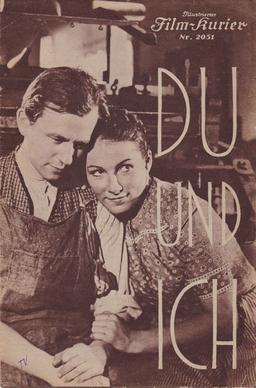
You and I is a 1938 German romance film directed by Wolfgang Liebeneiner and starring Brigitte Horney, Joachim Gottschalk and Paul Bildt.
The Man in the Saddle is a 1945 German film directed by and starring Harry Piel.
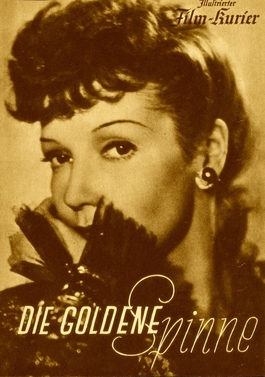
The Golden Spider is a 1943 German thriller film directed by Erich Engels and starring Kirsten Heiberg, Jutta Freybe, and Harald Paulsen.
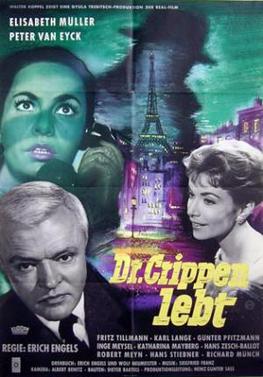
Doctor Crippen Lives is a 1958 West German crime film directed by Erich Engels and starring Elisabeth Müller, Peter van Eyck and Fritz Tillmann. It was made at the Wandsbek Studios of Real Film in Hamburg. The film's sets were designed by the art director Dieter Bartels.
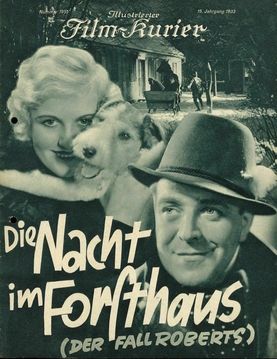
The Roberts Case is a 1933 German drama film directed by Erich Engels and starring Hermann Speelmans, Camilla Spira and Eduard von Winterstein. It was shot at the Johannisthal Studios in Berlin.

The Appeal to Conscience is a 1949 German mystery film directed by Karl Anton and starring Karl Ludwig Diehl, Werner Hinz and Gustav Diessl. It was originally shot in 1944, but remained uncompleted until it was finished by DEFA in the post-war era. It remained unreleased until it was given a 1949 premiere in Austria. Subsequently it was distributed in East Germany in 1950 and West Germany in 1951.

Alarm is a 1941 German crime film directed by Herbert B. Fredersdorf and starring Karl Martell, Maria von Tasnady and Paul Klinger. The production was made by the independent Aco-Film rather than one of Germany's major film companies. It was shot at the Althoff Studios and various locations around Berlin including Tempelhof Airport and the Karstadt Department Store. The film's sets were designed by the art director Bruno Lutz.

Rommel Calls Cairo is a 1959 West German war thriller film directed by Wolfgang Schleif and starring Adrian Hoven, Elisabeth Müller and Peter van Eyck. It is based on a real incident from the North African Campaign during the Second World War.
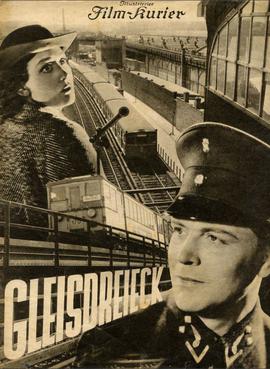
Dangerous Crossing or Rail Triangle is a 1937 German crime film directed by Robert A. Stemmle and starring Gustav Fröhlich, Heli Finkenzeller, and Paul Hoffmann. It is set amongst railway workers and takes its name from Gleisdreieck on the Berlin U-Bahn. It was partly shot at the Babelsberg Studios in Potsdam. The film's sets were designed by the art directors Carl Böhm and Erich Czerwonski. It was shot on location around Berlin. It premiered at the city's Ufa-Palast am Zoo.

The Accusing Song is a 1936 German musical drama film directed by Georg Zoch and starring Louis Graveure, Gina Falckenberg and Walter Rilla. It was shot at the Tempelhof Studios in Berlin.

Operation Sleeping Bag is a 1955 West German comedy war film directed by Arthur Maria Rabenalt and starring Eva Ingeborg Scholz, Paul Klinger and Karlheinz Böhm.

Blind Justice or Excluded to the Public is a 1961 West German crime drama film directed by Harald Philipp and starring Peter van Eyck, Marianne Koch and Eva Bartok.

















